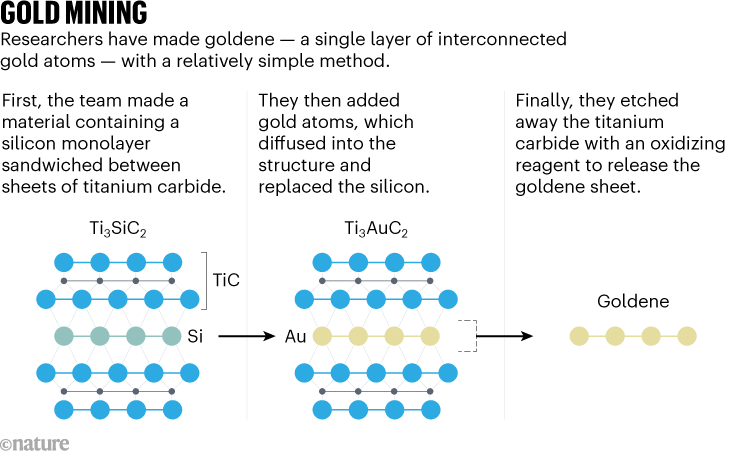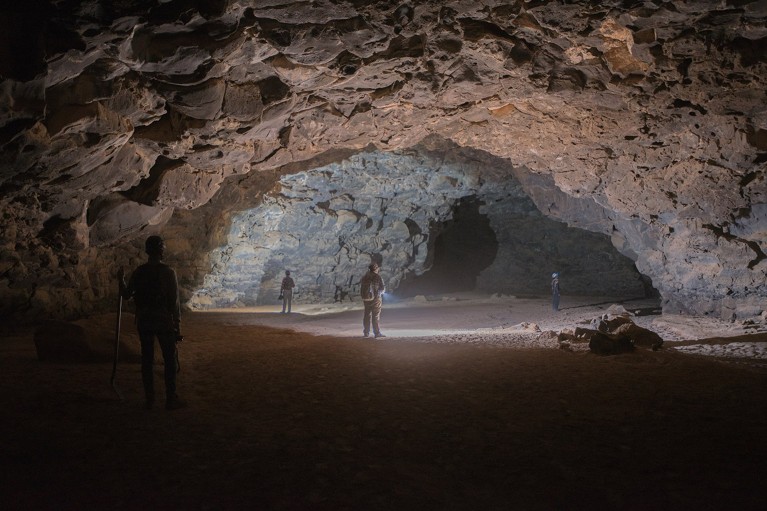Hello Nature readers, would you like to get this Briefing in your inbox free every day? Sign up here.

Researchers have synthesized sheets of gold that are one atom thick.Credit: imaginima/Getty
Meet goldene: a single layer of gold atoms
Goldene is a cousin of graphene, the single-atom-thick sheet of carbon first discovered in 2004 — but made of gold. Goldene is roughly 400 times as thin as the thinnest commercial gold leaf, and might find use as a catalyst, or in light-sensing devices.
Reference: Nature Synthesis paper

Source: Adapted from Ref. 1.
Canada boosts PhD and postgraduate pay
Researchers in Canada are thrilled by “the largest investment in graduate students and postdocs in over 21 years”, says Kaitlin Kharas, a PhD student and executive director of the campaign group Support Our Science.
The 2024 Canadian federal budget gave:
• whopping increases to stipends for masters and PhD students and postgraduate researchers
• an extra Can$1.8 billion over five years in core funding for the three federal research councils
• more than Can$2 billion for the AI sector in Canada
Bumblebees survive a week underwater
The queens of some species of bumblebee can survive after being underwater for one week, which could help them withstand floods when they hibernate underground. An experimental accident revealed the possibility, and tests on 126 common eastern bumblebee (Bombus impatiens) queens confirmed that most can survive immersion for up to 7 days. The findings hint that other bee species could also have built-in flood resilience. “This seems to be one small aspect of climate change that we need not worry about,” says bee researcher Dave Goulson.
Reference: Biology Letters paper
Cave provided shelter for 10,000 years
Hundreds of artefacts sheltered by a lava-tube cave in what is now Saudi Arabia show that herders and their livestock used the cave on and off for the past 10,000 years. The region near the Umm Jirsan cave was once lush and green. Now, wind and scorching heat mean that, across the surface of Saudi Arabia, “the fossil record is just horrendous”, says zooarchaeologist and study co-author Mathew Stewart. But an 88,000-year-old finger bone described in 2018 — one of the oldest human fossils found outside Africa — hints at the region’s hidden history.

Inside the Umm Jirsan lava-tube cave, researchers have found evidence of human occupation dating back 10,000 years.Credit: Green Arabia Project
Features & opinion
What toilet water reveals about our health
During the pandemic, sewage provided a critical source of data for monitoring the spread of SARS-CoV-2. In Hong Kong, routine wastewater tests traced the virus to a single apartment block where no COVID had been reported — ultimately uncovering nine active cases. Now “every day, we come up with new things that we can interrogate wastewater for”, says public-health researcher Ted Smith — including signs of drug misuse, antimicrobial resistance and exposure to air pollution. Wastewater research coordinator Bernd Manfred Gawlik calls wastewater the “dirty blood of the city”, and compares sewage sampling to blood testing. “We are now only starting to understand” how to diagnose this “blood” at the collective level, he says.
Keep lobbyists away from plastic treaty talks
Corporate lobbyists with vested interests in fossil fuels should be kept at arm’s length from negotiations for a global plastics treaty, writes ecotoxicologist Martin Wagner. The number of lobbyists from chemical and oil companies outnumbered scientists four to one in the previous round of talks. Their presence threatens to weaken the treaty by casting doubt on plastics research or demanding cumbersome risk assessments for individual component chemicals, says Wagner. Scientists also need better access to the talks for them to be meaningful, argues a Nature editorial.
Nature World View | 5 min read | & Nature Editorial | 5 min read
The experts’ view on smoking bans
Countries are introducing some of the toughest restrictions ever on tobacco use and vaping — especially among young people. New laws in the United Kingdom, Australia and France could save thousands of lives and billions of dollars, say scientists. Many nations are banning disposable vapes that don’t contain tobacco but still deliver nicotine, which can raise blood pressure and disrupt brain development. “This policy push should see the upswing in youth vaping contained and reversed,” says epidemiologist Tony Blakely.
